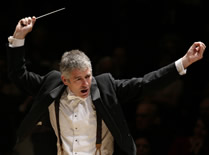 The concert on April 28th was an event, aye, a special event, with the opening piece performed by the winner of the UNC Symphony Orchestra Concerto Competition, Amy L. Zhang, a world premiere by highly acclaimed composer William Henry Curry and a stunning rendition of Tchaikovsky’s Serenade in C. All were performed by a pared-down version of the UNC Symphony Orchestra under the inspiring leadership of Tonu Kalam.
The concert on April 28th was an event, aye, a special event, with the opening piece performed by the winner of the UNC Symphony Orchestra Concerto Competition, Amy L. Zhang, a world premiere by highly acclaimed composer William Henry Curry and a stunning rendition of Tchaikovsky’s Serenade in C. All were performed by a pared-down version of the UNC Symphony Orchestra under the inspiring leadership of Tonu Kalam.
Zhang is currently a junior studying with UNC violin professor Nick DiEugenio. Last year was her first at Carolina, as she had transferred from NC State the previous year. She chose to play the popular showpiece Zigeunerweisen, Op. 20, by Pablo de Sarasate. The title “Gypsy Airs,” reflects the common misidentification of Hungarian folk music with the “gypsy music” of the Romani people. The themes of the piece are Hungarian in origin, vigorous and emotively expressive, and a challenging test of most of the technical and expressive skills a top-notch violinist is expected to master. The soloist and the orchestra reflected each other’s mastery of the thrilling music, whether wild twirling dance or intense passion. It was an excellent opening for this eventful evening of music.
Many years of friendship and professional regard have existed between Kalam and Curry. So it was that Kalam and the UNC Symphony Orchestra, assisted by Arts Everywhere, commissioned a new concert piece to be composed by Curry. Along came COVID-19 and things were delayed. Curry needed an earth angel, an inspiration. He wasn’t sure he could do it. Kalam was sure he could. Finally, the angel appeared, I believe, in the form of the spirit of Pauli Murray, particularly as embodied in the spiritual “Sometimes I Feel Like a Motherless Child.” Her book of poetry titled Dark Testament, provides the title and unifying spirit for Curry’s moving composition. Her memoir, Song in a Weary Throat, provides much more information about her remarkable life.
Curry is music director and conductor of the Durham Symphony Orchestra. He has played a significant role in the Triangle as resident conductor and Summerfest artistic director of the North Carolina Symphony Orchestra, and his influence has been experienced widely here and abroad with numerous world-renowned orchestras.
Curry’s ambition as a composer is to write music that speaks to all audiences; music like Gershwin’s “Summertime,” music that is expressed in the powerful voice of spirituals, fertile ground for so many fields of music, from Blues to Gospel and much more.
Dark Testament is written for string orchestra and is in three uninterrupted movements, each paying tribute to a trail-blazing African American woman: Mahalia Jackson, Murray, and Harriet Tubman. Their “songs” provided directions for the composer to express in musical terms despair, hope, and exhilaration.
The first movement is “Ain’t Gonna Let Nobody Turn Me ‘Round” (a tribute to Mahalia Jackson, “The Queen of Gospel”). The piece begins with a quodlibet of spirituals as found in a collection titled Slave Songs of 1867. Each section leader plays a different spiritual at a different tempo. This is suddenly interrupted by the defiant spiritual, “Ain’t Gonna Let Nobody Turn Me ‘Round.” The rest of this movement as well as the rest of the whole piece is driven by the rhythms of Gospel songs. The tribute to “The Queen of Gospel” was much appreciated. I remember her voice as being as smooth as glass and as pure as a drink of mountain water. Many urged her to pursue classical training, but she firmly and consistently declined because that was not her calling. Now Curry has given us a symphonic setting of these moving songs. Kalam led the orchestra in a warm and charming realization.
The second movement, “Love and Loss” (a tribute to Pauli Murray) was based on Murray’s aforementioned book of poetry, Dark Testament, which Curry chose as the title of his Gospel-based piece. Murray was born in Baltimore. Her mother died when she was three and shortly later her father was taken to an asylum where he was beaten to death by one of the guards, so how could she not have identified with the spiritual? Sent to Durham, NC, at the age of 4, she was raised, liberally, by her Aunt Pauline. Through more tragedy and trials, she became a lawyer, poet, civil rights activist, and the first African American Episcopal priest. And she supplied the special inspiration for Dark Testament. The music, like Murray’s life, is framed with the heart-breaking spiritual but is also filled with hope and determination.
The final movement is entitled “The Underground Railroad” (a tribute to Harriet Tubman). Of course, there were no steam engines or iron tracks involved in the Underground Railroad, but the imaginative, courageous, and daring Tubman established “stations,” “engineers,” “firemen,” and other railroading terms to help guide former slaves on their way to northern states or Canada. Curry provides his encouragements with some musical train sounds. Besides being a tribute to Tubman, this final movement sums up the spiritual journey from despair to hope. The orchestra found its way easily into the piece and played with skill and sensibility comparable to the artistry of old companions who have played together for many years.
The concert closed with Tchaikovsky’s Serenade in C, Op. 48. This lush sample of Tchaikovsky repertoire was given a majestic reading by Kalam, allowing the outstanding string orchestra, using an abundance of double stops, to present a shimmering wall of music.
The concert was another ISPC (“In Spite of Pandemic Concert”) with masks and social distancing observed. You may view it here.











